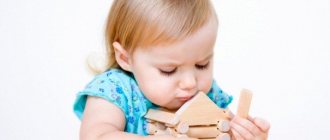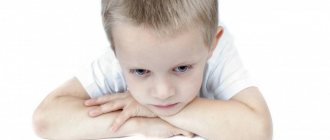Child psychology: how parents’ divorce affects children
The impact of parental divorce on children can be described as a shock. And if not immediately, then later it will still make itself felt. At the age of half naked, babies practically do not notice the absence of one of their parents and quickly forget him, provided that they are surrounded by maximum care from other relatives. The psychology of a child when his parents divorce is such that at the age of six months to 2.5 years, due to the absence of a father or mother, the baby’s mood can often and dramatically change. And at the age of 2.5 to 6 years, children sometimes experience psychological shock, often even serious. A child aged 6-9 years may experience quite severe depression due to this. Teenagers behave differently when their parents divorce; it all depends on their upbringing. Some may dislike their father, others may dislike their mother. The ideal case is when a teenager maintains a good relationship with both dad and mom, but at that age when the child does not always understand himself, when he experiences mental and physiological changes, this is practically impossible.
How does parental divorce affect children, how do kids feel? Research has shown that many adults are convinced that preschool children are too young to experience divorce in any way. Probably, guided by this perception, most spouses do not tell the child anything about the upcoming divorce. In this case, children themselves begin to look for the reasons for what is happening. The impact of parental divorce on the child’s psyche is such that many preschoolers blame themselves for the separation of adults: “I behaved badly, that’s why dad leaves.” And it is often very difficult to dissuade them of this.
The worst thing for children after their parents’ divorce is if mom and dad cannot establish contact with each other after the breakup. They cannot come to a compromise when dad should visit the child, in what ways he will participate in his life. Many fathers would like to see their children once a week, or maybe even more often, but there are quite a few mothers who allow this. Some mothers generally consider such meetings undesirable. If we touch on the issue of participating in the child’s upbringing (monitoring school performance, taking care of the child’s free time), then after a divorce dads are more willing to choose the option of giving gifts to the child.
If the mother is not against the baby meeting with the father, then soon a situation may arise when she notices that the child, especially a boy, is more drawn to his father and looks forward to every meeting with him. This naturally makes her resentful because she does all the day-to-day care of the child, while “Sunday dad” gets more love. Mom begins to shower the baby with gifts, dad does the same, the child rushes between parents, but over time he realizes the benefits of this state of affairs and shamelessly takes advantage of the situation. Needless to say, such parental behavior can have a bad impact on the child’s personal and mental development, which will manifest itself over the years, and it will be difficult to change anything.
However, the most serious consequences for a child from parental divorce is being raised in an incomplete family. And no matter how hard the mother tries, no matter what efforts she makes, she is not able to fully satisfy all the psychological needs of the child. Dad’s departure from the family can negatively manifest itself already in adolescence (in certain adaptation difficulties), later in marriage, as well as in psychological and sexual development.
A loving mother tries with her love and care to compensate for what, as it seems to her, her children are not receiving due to the absence of a father. She takes the position of a guardian towards them, controlling and constantly restraining the children’s initiative. This behavior of the mother harms the child, as it contributes to the formation of an emotionally vulnerable, dependent, selfish and subject to outside influence personality.
Children from single-parent families often find themselves under moral and psychological pressure from children from two-parent families, and this in turn leads to the development in them of a feeling of self-doubt and even embitterment and aggressiveness.
Psychologists have concluded that children's experiences of parental divorce may subsequently influence their performance of marital or parental roles.
Situation of hostility in divorce
With high tension, mutual hostility and bitterness that precedes divorce or manifests itself after it, children have difficulty adapting to the new developmental situation. A conflict situation between spouses serves as the basis for the development of a child’s sense of his own distress and vulnerability.
Quarrels between parents lead to the fact that children begin to show aggressiveness and irritability; tics, various neuroses and severe phobias, sometimes even hysterical fits, can develop. Often children find themselves in a victim situation - when one of the adults literally forces them to take their position. It is obvious that court debates worsen the situation not only for the child, but also for the parents: but the worst effect is on the child’s psyche.
The impact of parental divorce on an infant and the reaction of preschool children
Next, we will look in detail at how children cope with their parents’ divorce and how they feel about it.
Psychologists believe that divorce is a stressful situation for a child, which can cause a disturbance in their mental balance. 5-7 year old children, mostly boys, react especially sharply to divorce. For girls, the period when they experience the absence of their father the most is the age from 2 to 5 years.
Some experts, however, are inclined to believe that sometimes a divorce can be beneficial for a child, if, of course, it changes for the better the child’s living conditions and the formation of his personality. For example, when a mother leaves a drinking father or when, after a divorce, all quarrels and scandals in which the child was involved cease.
Even an infant when his parents divorce is capable of experiencing a certain psychological trauma, the same as his mother. Research shows that during breastfeeding, the frequency of oscillations of the eyeball and the frequency of sucking movements in the baby coincide with the mother's pulse rate. If a mother is under stress caused by a divorce, then in most cases the process of breastfeeding stops prematurely.
The impact of parental divorce on preschool children is no less acute. Foreign researchers have come to the conclusion that for a child of this age group, parental divorce is a breakdown of stable concepts about the family structure, habitual relationships with mom and dad, and a conflict between attachment to parents.
“Remote” parental love may be better than “close”
The emotional connection between people can be much more important than their actual presence together in some place. Therefore, divorce cannot destroy the relationship between the child and the parent who left the family. Moreover, sometimes “distant” parental love can be even better than “close” one.
Some “Sunday” dads after a divorce begin to pay much more attention to their children than when they lived in the family, and worked all day, and spent the weekend drinking beer and football with friends in the bathhouse or in the garage. It is after a divorce that some fathers begin to truly communicate with their children and take an interest in their lives.
Of course, if the child has an adoptive father, or his biological father has a new family, then it will be somewhat more difficult for them to communicate. But in any case, you can be an excellent father even in a divorce. To do this, you just need to be actively interested in the child’s life, his hobbies and interests, communicate and meet with him at the first opportunity and maintain contact via Skype and email. It’s even better if the child and his biological father have a common hobby. This could be music, sports, science, literature, etc.
If a father and child manage to maintain or re-create a strong emotional connection after a divorce, then, in principle, there will not be much difference in where they live and spend the night. From a psychological point of view, the child will still live in a complete family.
Aggressive behavior in children who have experienced parental divorce
According to the observations of psychologists, children 2.5-3.5 years old showed a reaction to divorce in the form of crying, sleep disturbances, addiction to their own things, toys, and decreased cognitive processes.
The behavior of children aged 3.5-4.5 years when their parents divorce becomes more embittered, aggressive, and anxious. Boys at this age experience separation from adults more acutely than girls. This can be explained by the fact that during this period there is an accelerated assimilation of stereotypes of male role behavior, and the departure of the father interrupts this process.
Children aged 5-6 years showed greater aggressiveness, anxiety, and irritability. Aggressive behavior in children who have experienced a parental divorce is explained by the fact that children of this age category already have a fairly good idea of what changes in their lives occur when adults separate; they are already able to describe them and talk about their experiences. Such children do not experience pronounced changes in development or decrease in self-esteem. Among them, the girls' father's departure is more acute for them.
The only child in the family, regardless of age, experiences the departure of one of the parents more acutely. The reaction of divorce to parents of children who have a brother or sister is easier because, no matter how strange it may sound, they have the opportunity to take out their anxiety or aggression on each other, which reduces their emotional stress, and this is less likely to lead to nervous breakdowns.
Children are the main victims in divorce “wars”
For every divorcing couple (and in Russia every second marriage ends in divorce), the period of realizing that “you can’t live like this anymore” comes at different times. Some people get divorced just a few months after the wedding, some after a year, some after 15-20 years.
It is good if the separating spouses are convinced that they are absolutely unsuitable for each other before the birth of their offspring. In this case, their divorce will not have any negative psychological consequences for anyone except themselves, who for some reason rushed to visit the registry office. If they have children by this time, then they will become the main victims in the “divorce” wars. The separation of parents will certainly affect their future lives and relationships with the opposite sex.
How children and adolescents cope with their parents’ divorce and the consequences of their experiences
The consequences of divorce can negatively affect the child's entire subsequent life. Here's how a parent's divorce affects a child, according to statistics:
- 31.1% of children have decreased school performance;
- 19.6% have violations of discipline at home;
- 17.4% of children require increased attention;
- 8.7% run away from home;
- 6.5% have conflicts with friends.
Experts say that every fifth child with neurosis has experienced separation from their father.
Mental trauma received after parents' divorce manifests itself differently in adolescents than in children of other age groups. It is teenagers who experience the divorce of their parents the hardest. Due to the divorce of their parents, guys may lose faith in love, may avoid close relationships and obligations, their communication with others is rather superficial, they prefer large companies.
Parents also face the problem of cruelty in a teenager who grew up without a father. If there is no positive model of male behavior in the family, such adolescents may not distinguish between masculine and pseudo-masculine behavior. Behind the desire to rise at the expense of the weak, to humiliate him, they hide their inadequacy, because teenagers who grew up in single-parent families have low self-esteem.
According to experts, even after 1-2 years, the situation of parents’ divorce can cause a severe form of neurosis in a teenager!
The older the child, the more gender differences appear in him. Therefore, the consequences of parental divorce can be more serious. They become noticeable not only in the family, but also outside it. They can manifest themselves in the form of aggression at school, on the street, unexpected tears, conflicts, absent-mindedness, etc.
In order to reduce the negative impact on the psyche of their children, divorcing parents should know and remember that the child’s mental health largely depends on the nature of the relationship that the parents have after the divorce, on their ability to maintain friendly feelings and raise their children together.
Consulting a child psychologist
Quite often, young families break up and, due to their inexperience, parents are unable to find the right words so as not to harm the fragile psyche of their child.
A psychotherapist will definitely give advice, teach and help you find an approach, regardless of the nature of the children and their emotional state.
Sometimes psychological help is required not for the correct presentation of information, but to reduce the emotional trauma of a teenager.
For preschool children, assistance is based on the following methods:
- play therapy;
- art therapy;
- fairytale therapy.
Communication with a child and his upbringing after parents’ divorce
In psychology, there are several types of communication between parents and children after divorce and relationships between future spouses.
- Great comrades. Such couples maintain friendly relations even after divorce. In this case, the spouses communicate quite often. But they cannot maintain such relationships for life, so they turn into other types - “cooperative colleagues” or “angry allies.”
- Collaborating colleagues. In this case, parents also maintain a fairly high degree of communication. In this case, parents interact quite effectively on issues of raising a child after a divorce. Naturally, such couples over time transfer their relationship to the category of “angry allies.” But most of them still maintain this type of relationship, even if they remarry.
- Angry allies. These are the couples who maintain forced communication, jointly solving their child’s problems. In this category there are people who cannot suppress their negative emotions towards each other and allow these feelings to manifest themselves in the process of communication. The separately living parent is allocated a strictly designated time to communicate with the child. Couples who practice this type of communication after divorce subsequently move into the category of “ardent enemies” or “broken up duos,” although some of them improve their relationship to “cooperative colleagues.”
- Ardent enemies. These are couples who are so mired in conflicts that their disputes during divorce are resolved through the courts. They, as a rule, communicate little, and only on official occasions.
- Broken duet. Such couples completely cut off all contact with each other after a divorce. These are typical families with one parent, where there is simply no place for the second.
In most cases, after a divorce, the child remains with his mother, and how he will experience the situation with his parents’ divorce largely depends on how the mother treats this problem. Her behavior in relationships with children and the form of discussion with them about this situation can either further aggravate their mental state, or, conversely, improve it.
Types of mother's attitude towards the situation of divorce.
- Mom avoids all mention of the father and raises the children as if he did not exist at all.
- Mom is trying to discredit his father, trying to erase even his most insignificant positive qualities from childhood memories. Blames the father for the breakdown of the family and reduces his contacts with children to a minimum.
- The most difficult path is when a woman tries to keep both parents for her children. Such a mother explains to them that dad has his shortcomings, but he also has certain advantages.
If parents separate siblings who are attached to each other after a divorce, this can cause even greater psychological trauma than the divorce itself.
The problem of new parents: blended families
Do the problems that arise after a divorce in children disappear after their parents renew their relationship with a new partner? Obviously not. Of course, many children are loyal to the appearance of new adults in their lives who take on a parental role, but some children experience this turn of events very painfully. A new marriage for children means the failure of their hopes for restoring relations between parents (genetic - in this case). That is why they often sabotage all attempts of the new parent to establish contact with the child, demands for discipline and manifestations of love.
Literally - children may experience themselves as guilty before the “old” parent for the fact that he treats the new one warmly. To some extent, they may feel this as a betrayal. Moreover, children may be jealous of the remaining parent of the new partner, as they may feel the instability of the situation and are afraid of losing the last relative. Many children also have difficulty bonding with their stepbrothers or sisters. This is especially problematic in adolescence, since a completely understandable sexual attraction to a step-relative of the opposite sex can develop: after all, genetically these are completely different people. This raises the thorny question of whether such a relationship is considered incestuous.
In a normal situation, adaptation to a new situation takes about two years. If there are difficulties later, then this is a reason to consult a psychologist. After this period, both parent and child adapt to the new situation and begin to lead a normal life. However, the trauma of divorce can resurface during puberty and early adulthood.
So, we will end with the fact that while there are current problems related to divorce, they can become a serious obstacle to the healthy development of the child.
How to tell your child about their parents' divorce
We must also pay attention to how to correctly tell a child about his parents’ divorce, because not all adults, in the heat of resentment towards each other or even hatred, can correctly present this news to their child.
- Do not hide the situation of divorce from your child, as ignorance can increase his anxiety.
- Make it clear to him that mom and dad still love him, will be there and will continue to take care of him, they will just live separately.
- Tell your child about the divorce together with your spouse. He must be completely sure that he is valuable to both parents, that they have no disagreements about what kind of relationship they will have with the child after the divorce.
- If your child is not yet in his late teens, don't ask him who he wants to live with. And, of course, don’t try to separate brothers and sisters, no matter what your goals are.
- Give your child the opportunity to freely discuss the issue of divorce with both mom and dad for as long as he needs it.
- Try not to change the child's lifestyle, for example, if you have moved to another area, do not take him out of the kindergarten or school he went to before the divorce. This will help maintain a stable circle of friends and interests for the baby, which is very important for him.
One of the important problems is mother's resistance to fathers' attempts to maintain relationships with children after divorce. But this is wrong, because the father should see his child and communicate with him.
In the heat of anger and resentment towards her ex-husband, the mother will not immediately be able to understand how good this is. But after talking with women whose husbands did not show such interest in their children after the divorce, they will quickly understand what a trauma it is for a child, teenager, and later an adult, when dad did not come to his birthday, did not call and was not interested in how his daughter or son were doing.
Remember that in any case, the divorce of parents has a huge impact on the fate of the children, but whatever the relationship between the mother and father after the breakup, the child should not suffer.
Child-parent relationships
Even after the divorce process is completed, the child should feel love from both parents, which gives him more strength to accept the new situation. The child’s emotions should not be ignored or criticized; at least one parent should support the expression of the child’s feelings - because this helps to cope with the negative side of the parents’ separation.
Here we note that constant emotional contact between a child and a parent is much more important than the actual presence of an adult in the living space where the child arrives.
Advice from psychologists on how to prepare and help endure the divorce process
Psychologists have collected several recommendations that will help you endure the separation of your parents less painfully:
- treat with understanding and care;
- give the baby time to experience negative emotions;
- do not allow him to become isolated, talk more and support the baby;
- do not allow your ex-spouse to be blackmailed;
- At first, it is advisable to spend the weekend with your family, for example, go to the cinema or park together.
Dear readers, the information in the article may be out of date, take advantage of a free consultation by calling: Moscow +7
, St. Petersburg
+7 (812) 425-62-38
, Regions
8800-350-97-52
Reducing educational opportunities
Before the divorce, each spouse had his own role: the father is the head of the family, he can be strict and stern. The mother is usually the main source of love for the child. But after a divorce, the situation changes - the mother is forced to combine several roles at once. To a certain extent, she also takes on the male role, and the child especially needs her femininity - tenderness, care, affection. A mother deprived of male support is psychologically traumatized, and this is reflected in her attitude towards her children. When demanding discipline from their children, divorced mothers are sometimes more concerned with formal obedience than with the child's emotional well-being.
Thus, we have indicated the factors that prevent parents from properly responding to the educational needs of the child after divorce.
Ksenia Rybakova











